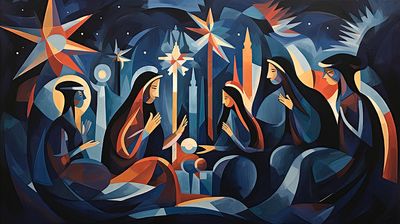Nativity of Our Lord
“Good news” is a familiar phrase for Christians, but in the world outside the bible the Greek word we translate as “bringing . . . good news” (Luke 2:10) was used to announce a new emperor. The Emperor Augustus commands that the world be counted, and those with the least are required to do the most to fulfill the requirements of those in power. The scene at the manger, however, is anything but imperial. In Bethlehem, God’s power is revealed in weakness, and the people who count include even the migrant laborers keeping watch over their flocks by night.
What does it mean this Christmas for us to hear that God is found in the hidden, the neglected, the immodest places of the world? What does it mean for us this year to know that when God takes a census, all the people of the world matter as much as any citizen of any empire?
The Nativity of Our Lord is the story of God’s reign spilling over the boundaries set by the powerful people of the world and into the margins. Dark nights and fragile infants interrupted by migrant laborers and choirs of angels point to a vision of the world as it should be, where “being connected” to the right people is replaced by being interconnected through a spirit of unity that brings us all out of the margins and into the center of life. In the infant Jesus, God declares a new standard for power, a word of hope, “good news” for all who are fragile, all who are weak, all who are overlooked, all who are despised, all who are abandoned, all who are homeless, all who are hovering between life and death. The festival of the incarnation is indeed “salvation to all” (Titus 2:11).

